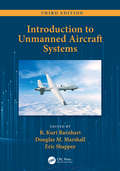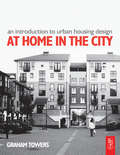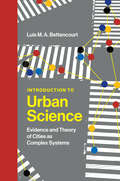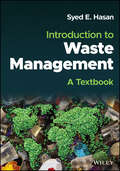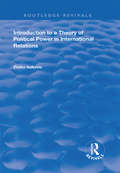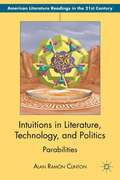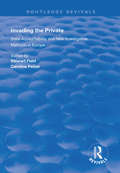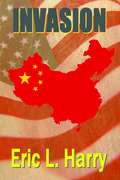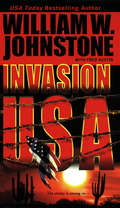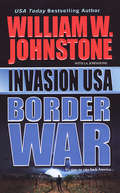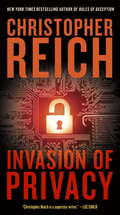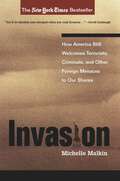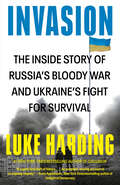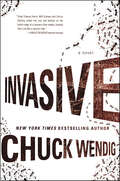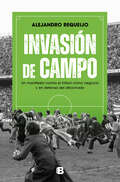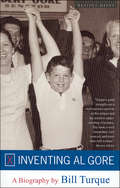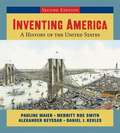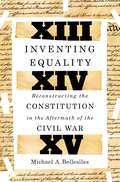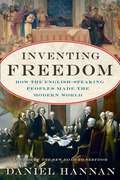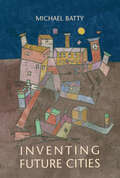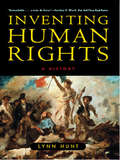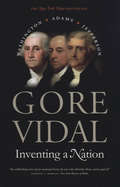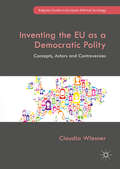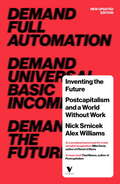- Table View
- List View
Introduction to Unmanned Aircraft Systems
by R. Kurt BarnhartIntroduction to Unmanned Aircraft Systems, Third Edition surveys the basics of unmanned aircraft systems (UAS), from sensors, controls, and automation to regulations, safety procedures, and human factors. Featuring chapters by leading experts, this fully updated bestseller fills the need for an accessible and effective university textbook. Focussing on the civilian applications of UAS, the text begins with an historical overview of unmanned aerial vehicles, and proceeds to examine each major UAS subsystem. Its combination of understandable technical coverage and up-to-date information on policy and regulation makes the text appropriate for both Aerospace Engineering and Aviation programs.
Introduction to Urban Housing Design: At Home In The City
by Graham TowersThis clear and concise guide is the ideal introduction to contemporary housing design for students and professionals of architecture, urban design and planning. With the increasing commitment to sustainable design and with an ever-increasing demand for houses in urban areas, housing design has taken on a new and crucial role in urban planning. This guide introduces the reader to the key aspects of housing design, and outlines the discussion about form and planning of urban housing. Using chapter summaries and with many illustrations, it presents contemporary concerns such as energy efficient design and high density development in a clear and accessible way. It looks at practical design solutions to real urban problems and includes advice on reclamation and re-use of buildings. The guidance it presents is universally relevant. Part two of the book features current case studies that illustrate the best in high density, sustainable housing design providing the reader with design information, and design inspiration, for their own projects.
Introduction to Urban Science: Evidence and Theory of Cities as Complex Systems
by Luis M. BettencourtA novel, integrative approach to cities as complex adaptive systems, applicable to issues ranging from innovation to economic prosperity to settlement patterns.Human beings around the world increasingly live in urban environments. In Introduction to Urban Science, Luis Bettencourt takes a novel, integrative approach to understanding cities as complex adaptive systems, claiming that they require us to frame the field of urban science in a way that goes beyond existing theory in such traditional disciplines as sociology, geography, and economics. He explores the processes facilitated by and, in many cases, unleashed for the first time by urban life through the lenses of social heterogeneity, complex networks, scaling, circular causality, and information.Though the idea that cities are complex adaptive systems has become mainstream, until now those who study cities have lacked a comprehensive theoretical framework for understanding cities and urbanization, for generating useful and falsifiable predictions, and for constructing a solid body of empirical evidence so that the discipline of urban science can continue to develop. Bettencourt applies his framework to such issues as innovation and development across scales, human reasoning and strategic decision-making, patterns of settlement and mobility and their influence on socioeconomic life and resource use, inequality and inequity, biodiversity, and the challenges of sustainable development in both high- and low-income nations. It is crucial, says Bettencourt, to realize that cities are not "zero-sum games" and that knowledge, human cooperation, and collective action can build a better future.
Introduction to Waste Management: A Textbook
by Syed E. HasanIntroduction to Waste Management An introductory textbook offering comprehensive coverage of the management of municipal, hazardous, medical, electronic, and nuclear waste Written by an experienced instructor in the field of solid waste management, this modern text systematically covers the five key types of solid wastes: municipal, hazardous/industrial, medical/biological, electronic, and nuclear, discussing their sources, handling, and disposal along with the relevant laws that govern their management. With its emphasis on industry standards and environmental regulations, it bridges the gap between theoretical models and real-life challenges in waste disposal and minimization. Instructors and students in environmental science, geology, and geography may use Introduction to Waste Management: A Textbook to better understand the five main types of solid waste and their management both from a local and a global perspective.
Introduction to a Theory of Political Power in International Relations
by Zlatko IsakovicThis title was first published in 2000: An in-depth look at the definition of power. The writing is well crafted and very readable and comprises a range of theoretical deliberations and analysis of the numerous aspects of political power and its use in international relations. This includes an examination of idea and structure: population; territory; economics; military; the political system; ideology; and morale and its forms appearing in international relations in the past, present and future: influence and force. This, coupled with the author’s gift for teasing out the pertinent points in an argument and using relevant and interesting examples, provides an excellent piece of comprehensive insight into a theory of political power.
Intuitions in Literature, Technology, and Politics: Parabilities (American Literature Readings in the 21st Century)
by Alan Ramón ClintonUsing the idea of 'parability,'or the ability for writers to tell improper stories, as a foundation, Alan Ramón Clinton synthesizes a new model for a creative, more daring literary criticism. Sharp and surprising, this wide-ranging project engages with the work of Pynchon, Eco, Forché, Merrill, Weiner, Plath, Ashbery, and Eigner.
Invading the Private: State Accountability and New Investigative Methods in Europe (Routledge Revivals)
by Stewart Field Caroline PelserFirst published in 1998, this volume seeks to examine a range of policing techniques which are new, if not in their conception, then at least in their importance to the form of police enquiries in the late 20th century. Some of them are beginning to be discussed under categories of 'proactive' or 'covert' policing: others are termed 'technological' because they depend intimately on the development of the new information technologies. In much of Western Europe and North America the nature of police investigative methods is being transformed. At the centre of these developments are three main trends. First, there is the increasing use of covert intelligence-gathering techniques such as participating informers, police undercover operations and surveillance proactively targeted at ‘suspicious’ individuals or networks. Secondly, there is the development of increasingly sophisticated information gathering and processing technologies (DNA) and fingerprint data bases, general intelligence storage systems, computer analysis of open source data, the Internet). Lastly there is an extending exploitation of powers to compel private individuals and companies to provide the state with information about themselves and third parties (including the use of information originally supplied to the state for purposes other than criminal investigation). This book argues that in different ways these trends represent a new invasion of the private sphere by investigative methods and a new challenge for traditional mechanisms for rendering the state’s policing accountable such as the trial, the judge and the defence lawyer. Bringing together contributions from sociologists and lawyers in Western Europe and North America, it surveys these developments, considers the regulatory options for their control and their implications for legal principles of privacy and due process.
Invasion
by HarryChina has become the new, dominant superpower. She has expanded - with a new, brutally efficient military machine - throughout the globe. Asia is subjugated and the Middle-East has been crushed. With blinding speed, Europe has been cut off by blockade. But while the world burns, America wallows in isolationist splendour; her defence budgets are cut and her armed forces atrophy. The book opens as a five million man army is poised to invade the American south from Cuba. A new President has been elected, who is frantically trying to rearm but all seems doomed as the inevitable invasion approaches.
Invasion Usa
by William W. JohnstoneA military vet forms a militia to fight the scourge of gang violence in his Arizona town in the New York Times–bestselling author&’s border crisis thriller.Little Tuscon, Arizona, is being terrorized by M-15—a murderous Central American gang smuggling drugs through the ill-protected border. With Washington turning a blind eye to the crisis, Vietnam vet Tom Brannon takes the law into his own hands. Forming a volunteer army called The Patriot Project, Brannon fights to restore law and order. But their initial victory is short-lived.When M-15 comes back to take out the Patriots, they bring major reinforcements. Outnumbered and outgunned, Tom Brannon must defend their families, their homes, and their country against a merciless enemy. And each of the Patriots is prepared to live free or die.
Invasion Usa: Border War
by William W. JohnstoneWhen a Mexican gang hijacks a school bus full of American school girls, a Vietnam vet takes matters into his own deadly hands in this border thriller.The gang of kidnappers is led by the ruthless crime lord Alphonso Guerrerro, whose daughter is on that bus. His ex-wife took his daughter back to the States, but Alphonso wants her back—and will stop at nothing to get her. Now he's got a devil's bounty of young women to be used as hostages, or sold into the horrors of slavery if his demands are not met. But Vietnam vet Tom Brannon has something to say about this. His niece is on that school bus, so he's recruiting a battle-tough squad of ex-soldiers made up from the families of the kidnapped girls. They're going to rescue the girls and destroy Guerrerro and his gang of border thugs once and for all.
Invasion of Privacy
by Christopher ReichOne woman's quest to discover the truth behind her husband's death will pit her against a new generation of cutting-edge surveillance technology and the most dangerous conspiracy in America--Invasion of Privacy is the riveting, new standalone suspense novel from New York Times bestselling author Christopher Reich. On a remote, dusty road forty miles outside of Austin, Texas, FBI agent Joe Grant and a confidential informant are killed in a deadly shootout. Left to pick up the pieces is Mary Grant, Joe's young wife and mother of their two daughters. The official report places blame for the deaths on Joe's shoulders . . . but the story just doesn't add up and Mary has too many troubling questions that need answers. How did Joe's final voice mail--containing a cryptic warning for Mary, recorded moments before the fatal shooting--disappear without a trace from her phone? Stonewalled by the FBI, Mary will be drawn into a deadly conspiracy that puts her in the crosshairs of the richest and most powerful men in America . . . and the newest and most terrifying surveillance system known to man. New York Times bestselling author Christopher Reich is the master of crafting thrillers of the highest caliber, with nonstop action and nail-biting suspense. Invasion of Privacy is his richest, most relevant novel to date and will have readers hooked from the first page to the last. Your privacy is for sale.From the Hardcover edition.
Invasion: How America Still Welcomes Terrorists, Criminals, And Other Foreign Menaces To Our Shores
by Michelle MalkinInvasion: How America Still Welcomes Terrorists, Criminals, And Other Foreign Menaces To Our Shores by Michelle Malkin
Invasion: The Inside Story of Russia's Bloody War and Ukraine's Fight for Survival
by Luke HardingNew York Times bestselling author of Collusion and The Snowden Files Luke Harding&’s personal, frontline reporting on Russia&’s harrowing invasion of Ukraine, the biggest news event of the year and an inflection point in international politics&“An excellent, moving account of an ongoing tragedy.&” —Anne Applebaum, New York Times bestselling author of Twilight of DemocracyIn a damning, inspiring, and breathtaking narrative of what is likely to be a turning point for Europe—and the world—Guardian correspondent and New York Times bestselling author Luke Harding reports firsthand on the Russian invasion of Ukraine. When, just before dawn on February 24, 2022, Vladimir Putin launched a series of brutal attacks, Harding was there, on the ground in Kyiv. But this senseless violence was met with astounding resilience—from, among others, the country&’s embattled president, Volodymyr Zelenskiy—and the courage of a people preparedi to risk everything to preserve their nation&’s freedom. Here are piercing portraits of the leaders on both sides of this monumental struggle, a haunting depiction of the atrocities in Bucha and elsewhere, and an intimate glimpse into the ordinary lives being impacted by the biggest conflict in Europe since the Second World War. Harding captures this crucial moment in history with candor, insight, and an unwavering focus on the human stories that lie at its heart.
Invasive: A Novel
by Chuck WendigA gripping sci-fi tech thriller, set in the eye-opening, paranoid world of the electrifying Zeroes—from the New York Times–bestselling author of Wanderers.Hannah Stander is a consultant for the FBI—a futurist who helps the Agency with cases that feature demonstrations of bleeding-edge technology. It’s her job to help them identify unforeseen threats: hackers, AIs, genetic modification, anything that in the wrong hands could harm the homeland.Hannah is in an airport, waiting to board a flight home to see her family, when she receives a call from Agent Hollis Copper. “I’ve got a cabin full of over a thousand dead bodies,” he tells her. Whether those bodies are all human, he doesn’t say.What Hannah finds is a horrifying murder that points to the impossible—someone weaponizing the natural world in a most unnatural way. Discovering who—and why—will take her on a terrifying chase from the Arizona deserts to the secret island laboratory of a billionaire inventor/philanthropist. Hannah knows there are a million ways the world can end, but she just might be facing one she could never have predicted—a new threat both ancient and cutting-edge that could wipe humanity off the earth.“Enthralling . . . Wendig does an impeccable job blending fact and fiction as he describes invasive species and insects being used as biological weapons.” —The Washington Post“Think Thomas Harris’ Will Graham and Clarice Starling rolled into one and pitched on the knife’s edge of a scenario that makes Jurassic Park look like a carnival ride. Another rip-roaring, deeply paranoid thriller about the reasons to fear the future.” —Kirkus Reviews (starred review)
Invasión de campo: Un manifiesto contra el fútbol como negocio y en defensa del aficionado
by Alejandro RequeijoUn manifiesto contra el fútbol como negocio y en defensa del aficionado.Este libro es un alegato en defensa de la identidad de las gradas. Es un manifiesto contra la homogeneización que imponen las televisiones y el mercado. No, tu equipo no es una marca global ni un producto de lujo. El fútbol es un patrimonio cultural, social, familiar, incluso estético. Representa un legado a proteger frente a un modelo que expulsa al hincha y cuestiona su sagrado vínculo de pertenencia. Alejandro Requeijo -periodista de larga trayectoria y partícipe de investigaciones sobre la gestión de Luis Rubiales al frente de la Real Federación Española de Fútbol o la difusión de los audios de Florentino Pérez- hace de esta obra una verdadera declaración de principios sobre lo que es la pasión por el fútbol y señala a los culpables de haber contaminado el deporte más hermoso del mundo.
Inveighing We Will Go
by William F. Buckley Jr.Another collection of writing from William F. Buckley Jr., discussing such varied issues as the economy, religion, politics, education and communication.
Inventing Al Gore: A Biography (Biography Ser.)
by Bill TurqueA &“balanced, insightful&” biography of the politician that &“shows how the pressure to succeed has shaped virtually every aspect of Gore&’s career&” (Publishers Weekly, starred review). Why did Al Gore, after angry opposition to the Vietnam War, submit to the draft? What happened in Vietnam that made him sullen and bitter? After he renounced politics, what set this son of a Tennessee senator back on the track mapped out for him? What was the real nature of his partnership with Bill Clinton, and how was it altered by the Lewinsky affair? Inventing Al Gore addresses these issues and more as it unveils the true motivations, ideals, and idiosyncrasies of one of America&’s most inscrutable political figures. Bill Turque, who covered both of Gore&’s vice presidential campaigns and the Clinton White House, draws on extensive access to Gore&’s key advisers, friends, and family. He unmasks a man who in private can sing and dance to George Strait&’s music but in public measures every comment and gesture with legendary caution. As Turque details, Gore&’s great political albatross—a lack of empathy—was hatched during his lonely childhood as the product of ambitious political parents who groomed him for the presidency. Turque&’s keen analysis also uncovers the genesis of Gore&’s questionable fund-raising and of a political platform laden with worthy but emotionally safe planks such as bioethics and global warming. In addition, Inventing Al Gore illuminates how personal tragedies have shaped his political life—and the remarkable influence that women, from his mother to Naomi Wolf, have had on his career. &“Refreshing . . . Turque finds [Gore] to be like so many of the rest of us—occasionally decent, usually flawed, always conflicted.&” —Newsday
Inventing America: A History of the United States
by Pauline Maier Merritt Roe Smith Alexander Keyssar Daniel J. KevlesW. W. Norton presents Inventing America, a balanced new survey of American history by four outstanding historians. The text uses the theme of innovation—the impulse in American history to "make it new"—to integrate the political, economic, social, and cultural dimensions of the American story. From the creation of a new nation and the invention of the corporation in the eighteenth century, through the vast changes wrought by early industry and the rise of cities in the nineteenth century, to the culture of jazz and the new nation-state of the twentieth century, the text draws together the many ways in which innovation—and its limits—have marked American history.
Inventing Equality: Reconstructing the Constitution in the Aftermath of the Civil War
by Michael BellesilesThe evolution of the battle for true equality in America seen through the men, ideas, and politics behind the 13th, 14th, and 15th Amendments passed at the end of the Civil War. On July 4, 1852, Frederick Douglass stood in front of a crowd in Rochester, New York, and asked, “What to the slave is the Fourth of July?” The audience had invited him to speak on the day celebrating freedom, and had expected him to offer a hopeful message about America; instead, he’d offered back to them their own hypocrisy. How could the Constitution defend both freedom and slavery? How could it celebrate liberty with one hand while withdrawing it with another? Theirs was a country which promoted and even celebrated inequality. From the very beginning, American history can be seen as a battle to reconcile the large gap between America’s stated ideals and the reality of its republic. Its struggle is not one of steady progress toward greater freedom and equality, but rather for every step forward there is a step taken in a different direction. In Inventing Equality, Michael Bellesiles traces the evolution of the battle for true equality—the stories of those fighting forward, to expand the working definition of what it means to be an American citizen—from the Revolution through the late nineteenth century. He identifies the systemic flaws in the Constitution, and explores through the role of the Supreme Court and three Constitutional amendments—the 13th, 14th, and 15th—the ways in which equality and inequality waxed and waned over the decades.
Inventing Freedom: How the English-Speaking Peoples Made the Modern World
by Daniel HannanWhy does the world speak English? Why does every country at least pretend to aspire to representative government, personal freedom, and an independent judiciary?In The New Road to Serfdom, British politician Daniel Hannan exhorted Americans not to abandon the principles that have made our country great. Inventing Freedom is a much more ambitious account of the historical origin and spread of those principles, and their role in creating a sphere of economic and political liberty that is as crucial as it is imperiled.According to Hannan, the ideas and institutions we consider essential to maintaining and preserving our freedoms—individual rights, private property, the rule of law, and the institutions of representative government—are not broadly "Western" in the usual sense of the term. Rather they are the legacy of a very specific tradition, one that was born in England and that we Americans, along with other former British colonies, inherited.The first English kingdoms, as they emerged from the Dark Ages, already had unique characteristics that would develop into what we now call constitutional government. By the tenth century, a thousand years before most modern countries, England was a nation-state whose people were already starting to define themselves with reference to inherited common-law rights.The story of liberty is the story of how that model triumphed. How, repressed after the Norman Conquest, it reasserted itself; how it developed during the civil wars of the seventeenth and eighteenth centuries into the modern liberal-democratic tradition; how it was enshrined in a series of landmark victories—the Magna Carta, the English Civil War, the Glorious Revolution, the U.S. Constitution—and how it came to defeat every international rival.Yet there was nothing inevitable about it. Anglosphere values could easily have been snuffed out in the 1940s. And they would not be ascendant today if the Cold War had ended differently.Today we see those ideas abandoned and scorned in the places where they once went unchallenged. The current U.S. president, in particular, seems determined to deride and traduce the Anglosphere values that the Founders took for granted. Inventing Freedom explains why the extraordinary idea that the state was the servant, not the ruler, of the individual evolved uniquely in the English-speaking world. It is a chronicle of the success of Anglosphere exceptionalism. And it is offered at a time that may turn out to be the end of the age of political freedom.
Inventing Future Cities (The\mit Press Ser.)
by Michael BattyHow we can invent—but not predict—the future of cities.We cannot predict future cities, but we can invent them. Cities are largely unpredictable because they are complex systems that are more like organisms than machines. Neither the laws of economics nor the laws of mechanics apply; cities are the product of countless individual and collective decisions that do not conform to any grand plan. They are the product of our inventions; they evolve. In Inventing Future Cities, Michael Batty explores what we need to understand about cities in order to invent their future.Batty outlines certain themes—principles—that apply to all cities. He investigates not the invention of artifacts but inventive processes. Today form is becoming ever more divorced from function; information networks now shape the traditional functions of cities as places of exchange and innovation. By the end of this century, most of the world's population will live in cities, large or small, sometimes contiguous, and always connected; in an urbanized world, it will be increasingly difficult to define a city by its physical boundaries. Batty discusses the coming great transition from a world with few cities to a world of all cities; argues that future cities will be defined as clusters in a hierarchy; describes the future “high-frequency,” real-time streaming city; considers urban sprawl and urban renewal; and maps the waves of technological change, which grow ever more intense and lead to continuous innovation—an unending process of creative destruction out of which future cities will emerge.
Inventing Human Rights: A History
by Lynn Hunt"A tour de force."--Gordon S. Wood, New York Times Book Review How were human rights invented, and how does their tumultuous history influence their perception and our ability to protect them today? From Professor Lynn Hunt comes this extraordinary cultural and intellectual history, which traces the roots of human rights to the rejection of torture as a means for finding the truth. She demonstrates how ideas of human relationships portrayed in novels and art helped spread these new ideals and how human rights continue to be contested today.
Inventing a Nation: Washington, Adams, Jefferson (Icons of America)
by Gore VidalThis New York Times bestseller offers &“an unblinking view of our national heroes by one who cherishes them, warts and all&” (New York Review of Books). In Inventing a Nation, National Book Award winner Gore Vidal transports the reader into the minds, the living rooms (and bedrooms), the convention halls, and the salons of George Washington, Thomas Jefferson, John Adams, and others. We come to know these men, through Vidal&’s splendid prose, in ways we have not up to now—their opinions of each other, their worries about money, their concerns about creating a viable democracy. Vidal brings them to life at the key moments of decision in the birthing of our nation. He also illuminates the force and weight of the documents they wrote, the speeches they delivered, and the institutions of government by which we still live. More than two centuries later, America is still largely governed by the ideas championed by this triumvirate. The author of Burr and Lincoln, one of the master stylists of American literature and most acute observers of American life, turns his immense literary and historiographic talent to a portrait of these formidable men
Inventing the EU as a Democratic Polity: Concepts, Actors And Controversies (Palgrave Studies In European Political Sociology Series)
by Claudia WiesnerThe EU as a democratic polity has been invented: it is a product of creative and innovative actors and thinkers that conceptualized and by and by helped to realise it, from the beginning up to the present. But the concepts, ideas, and utopias of a democratic Europe differ considerably. The processes of inventing and building a democratic EU are marked by conceptual controversies in both public and academic debates. These are the resource for the present book, which focuses on the concepts, actors and controversies related to inventing the EU as a democratic polity. The chapters study exemplary long-term and detail cases related to inventing and institutionalizing the decisive elements of representative democracy in the EU—a parliament, citizens that vote for it in universal suffrage and governmental bodies that are linked to parliament in much the same way as government is in a parliamentary democracy.
Inventing the Future
by Alex Williams Nick SrnicekA major new manifesto for a high-tech future free from workNeoliberalism isn't working. Austerity is forcing millions into poverty and many more into precarious work, while the left remains trapped in stagnant political practices that offer no respite. Inventing the Future is a bold new manifest0 for life after capitalism. Against the confused understanding of our high-tech world by both the right and the left, this book claims that the emancipatory and future-oriented possibilities of our society can be reclaimed. Instead of running from a complex future, Nick Srnicek and Alex Williams demand a postcapitaiist economy capable of advancing standards, liberating humanity from work and developing technologies that expand our freedoms.
